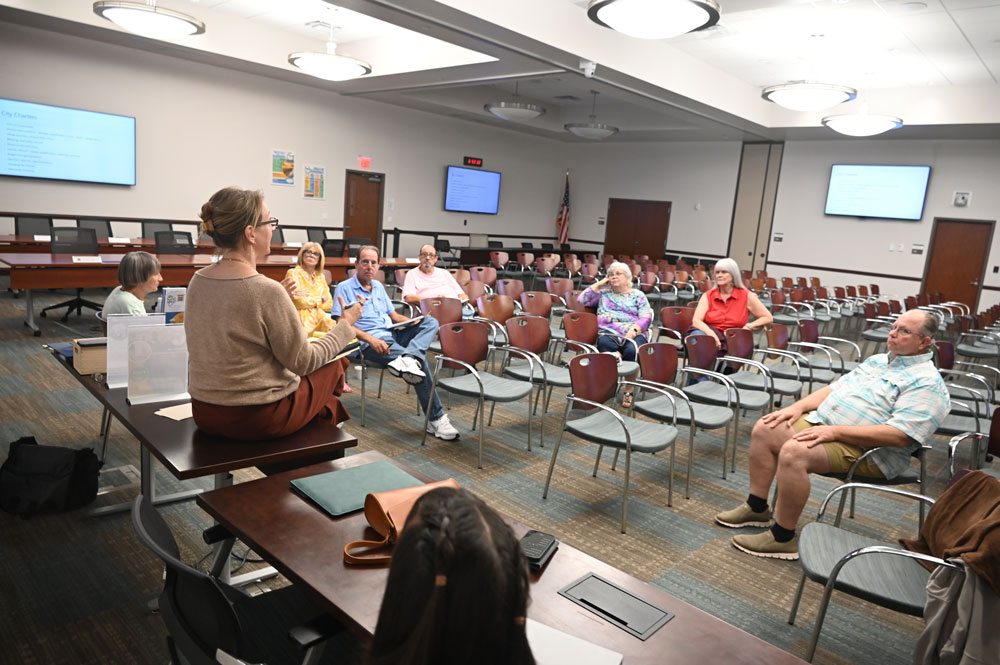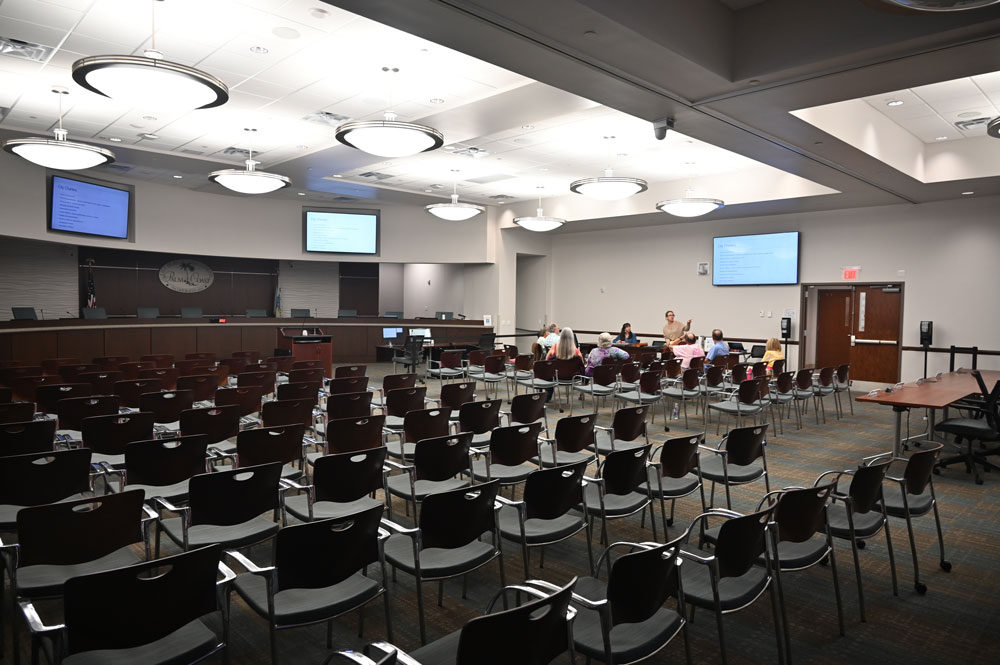
Only two residents unaffiliated with the charter-review process showed up at Thursday evening’s community workshop designed to solicit ideas and input from residents about the ongoing rewrite of the Palm Coast City Charter.
It was the second of four such scheduled workshops. Another is scheduled for tonight at 6 at the Palm Coast Community Center. The first, on Sept. 29 at the Southern Recreation Center, drew barely a dozen people, though they were engaged and proposed several changes.
Not so on Thursday: the two women who showed up had lived in Palm Coast for several years but had never gotten to know the city’s inner workings, and were curious about those workings. Based on the little they spoke at the workshop, they were ideal candidates for the city’s recurring Citizenship Academy. They had little interest in changing the charter, about which they had even less knowledge.
They were not the only ones there, to be sure. The literal headcount was 10. But three were members of the Charter Review Committee–Ramon Marrerp, Michael Martin and Perry Mitrano. Two were alternate members of the committee: Chatal Preuninger and Donna McGevna. City Clerk Kaley Cook was taking minutes. Georgette Dumont was moderating. There was a reporter, or maybe just a blogger.
Dumont didn’t have much to work with by the end of the session. Her legal pad reflected it. She’d jotted down a few lines, a few ideas from the floor–namely, from Preuninger, who has a more perfect attendance record at City Council meetings and workshops than some of the council members do.
Unsurprisingly, one of Preuninger’s suggestions for the charter, reheated and more punitive from when she made it at the Southern Recreation center workshop, is to forbid council attendance by zoom, let alone votes by zoom. (The technical difficulties Council member dave Sullivan experienced when, recovering from eye surgery, he voted by zoom during an unsuccessful attempt to hire a city manager was Exhibit A as others, among them Mitrano, approved of Preuninger’s idea.)
Dumont, a former elected official who’s shepherded numerous charter reviews in Florida, is skillful, cheery and inviting enough almost to make a chair talk: she puts complete strangers at ease, introducing herself to each as they walk in and making them feel as essential as if they were mayors for an evening (“this is your space,” she told the residents), though on Thursday she knew most of the audience and wished more strangers had walked in.
The workshop was held in the council’s vast chamber, making the gathering look even more pitiful than it was. Dumont had initially set up informally, sitting on a side table, a few chairs arrayed around her with those few familiar faces. If it got busier, she’d move to the front of the room. It never did. The small group remained in its informal circle. The workshop turned into more of a social session–the only thing missing was beer or a good bourbon–with a few injections of charter-related discussion.
For almost half an hour at the beginning, the discussion circled and recircled around public participation–why it was so terrible, what could be done to improve it, what should be done to improve it. If there was some unanimity on that score, it was for the city to videocast the workshops and the Charter Review Committee meetings, something the city has so far declined to do, though Cook, the city clerk, had what appears to be encouraging news on that score: “With the requests of the public and with the requests of the Charter Review Committee, that is in discussion and preparation with city staff,” Cook said. “So we have heard these comments. It is in progress.”

Lack of attendance is not a Palm Coast thing, however. “I will say that I’ve done a lot of charter reviews,” Dumont said, “and this is about what you get. Because it’s the charter, and people don’t really think about it, and they have lives, right?” The city’s 2017 charter review workshops hadn’t drawn much interest, either.
There officially as observers, Martin and Mitrano ended up contributing quite a bit to what discussion took place. Martin dismissed the suggestion that people don’t show up to meetings because they don’t think the charter is a problem: he has been pushing not only for a full rewrite, but for the drafting of a preamble, too, and one apparently longer than the U.S. Constitution’s 52 words. McGevna spoke at length, too, in discursive, entertaining monologues about “keyboard warriors” and tag-teaming attendance at these meetings with her husband, and her volunteering in city matters.
What McGevna said about the charter was not about the document itself so much as about what the city should have done to better publicize the review process. (Dhe briefly addressed the charter itself: “A lot of the chapters are really ambivalent. In one place it speaks to it, in another one, it disregards that rule,” she said. The charter is, in fact, not the sort of gem that would have passed Strunk and White muster.)
In the end, and almost on the strength of Pruninger’s exclusive suggestions alone, Dumont’s legal pad walked away with that suggestion about no zooming, and another rehashed suggestion about limiting council members’ pay increases either to the same inflation increases awarded city employees, or to referendums.
There was some discussion–prompted, unremarkably, by Preuninger–about not only preserving the $15 million limit on the city’s borrowing authority absent a referendum, as written in the charter, but on lowering it. Mitrano suggested raising that amount, but was also uncomfortable with hampering city management, though he appeared unaware that the limit applies only to borrowing or leasing backed by the city’s relatively small, $27 million general fund, not its other, much larger proprietary funds, like the utility. The council attempted to repeal that cap last November in a referendum. The referendum failed decisively.
A discussion about expanding the council to seven members did not get much traction. Dumont spoke about the committee’s ongoing review, and said that while the results may be voluminous, not all the proposals will be on the 2026 ballot. The council could withhold some for the next election in 2028, though by then the council will have a different majority.
Mercifully, the workshop ended about half an hour earlier than its slated 120 minutes.





























Deborah Coffey says
If the City Charter is only 22 pages, why wasn’t it sent to every resident electronically for review and the need to review it in the first place. What’s wrong with it? Is it like the entire U.S. Constitution being destroyed by Donald Trump? Maybe it’s not that we citizens aren’t interested; maybe it’s that we’ve lost all respect for the decisions made by the people in charge.
JimboXYZ says
Deborah Coffey, it’s online. Ordinances as well.
https://flaglerlive.com/wp-content/uploads/palm-coast-charter.pdf
https://library.municode.com/fl/palm_coast/codes/code_of_ordinances?nodeId=CITY_PALM_COASTCH
https://palmcoast.elaws.us/code/coor_city_palm_coastch
Deborah Coffey says
@ JIMBO
Thank you, Jimbo. I was just trying to make the point that if this is so important to us, one would think that those in charge could have sent the link to the public.
Jay tomm says
And how dose the comunity KNOW about these meetings? I saw no advertisements, billboards, signs, no mail, no electronic signs….
And since the PC government doesn’t listen to it’s residents anyway, many people go why bother!
Villein says
One would think in a representative democracy that the citizenry would not need to heavily involve itself in the review of the charter. The elected officials would appoint a committee to review and make suggestions as has happened. Perhaps the charter is good enough in its present form.
Don’t forget too that this is a retirement community and most residents don’t care much about the long term success of the city as they are only here for a short while- the rest of their lives.